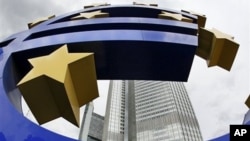Portugal has become the third European economy, after Greece and Ireland, to request a bailout from the European Commission. Now there are fears that Spain could be next.
It was the moment the Portuguese people - and European investors - had feared. Portugal's prime minister took to the nation's airwaves, explaining the time had come for his country's struggling economy to ask for a financial bailout.
Prime Minister Jose Socrates says he has a responsibility to think about Portugal's national interest, and asking the European Commission for financial help is in that interest. He says "everyone knows" that he regrets it, but the decision was "inevitable."
Portugal's economy has long lagged behind other European nations, with high government debt, burgeoning budget deficits and soaring unemployment. Vanessa Rossi, an economist at London's Chatham House think tank, says Portugal - like Greece and Ireland - simply was not in good enough shape to survive the recent global economic problems.
"The history of Portugal goes back many years, to having a poorly performing economy practically for the past decade, and continual budget deficits that built up to a higher than usual debt level," she said. "This had been a continuous problem they'd tried to address. But particularly when the world economy went into recession in 2009, this has made the struggle so much more difficult."
Europe's longest bridge, in Lisbon, stands as an example of European-funded infrastructure projects that failed to jumpstart Portugal's economy. Now the question is whether a bailout will do the trick, or whether it might go the way of previous European help, failing to truly fix problems at the root of Portugal's economy.
Rossi says Portugal's short-term emergency will be averted, but in the long term, the future is still uncertain.
"There's not going to be any immediate default," she said. "Portugal will have money in order to continue financing itself for the next two or three years. The question is, 'What happens then?' Can you find that new model which will generate a better opportunity to be able to work off this debt in the future. Many people have some doubts about that, given that this is not a new problem, and it seems to have been difficult to tackle in the past."
Another big question is how far the economic crisis will spread. Portugal's neighbor Spain has nearly 20 percent unemployment, after its huge housing bubble burst in recent years. The question was put to Spain's economy minister, Elena Salgado, by a local Madrid radio station.
Salgado says she can "absolutely rule out" the idea of Portuguese contagion spreading to Spain. She says the Spanish economy is "more diversified, more powerful" and "much more competitive than Portugal's."
For now, financial markets seem to believe her. Spain was able to sell 4.1 billion euros of government debt Thursday, and investors accepted lower interest rates than expected.
Rossi says she thinks Spain will fare better than Portugal.
"To be fair, Spain has made enormous efforts to be able to tackle its problems, in terms of cutting the budget deficit, in terms of looking at the issues of recapitalizing the banks," she said. "It was also true that Spain went into this problem with a far lower level of government debt. Therefore, their ability to cope with this situation is still positive. I think every effort will be made not only by Spain, but also by the rest of the eurozone countries, to make sure that Spain actually continues with its own self-funded solution, and does not turn into a bailout situation such as Portugal."
In recent months, Spain has increased taxes, cut public sector wages raised the retirement age from 65 to 67. Spain's total economy is bigger than those of Portugal, Greece and Ireland put together. That means it could be too big to fail - but also more expensive for Europe to bail out.
Portugal Seeks European Bailout; Could Spain Be Next?













